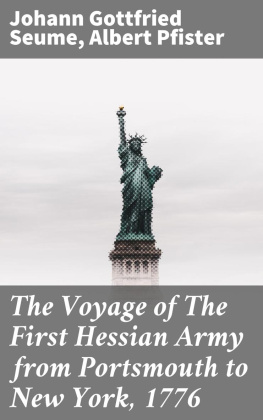"
The following Historical Sketch is a translation from the German of A. Pfister. It was published some fifty years ago in a German periodical and is interesting enough to be reprinted in English as it contains hitherto very little known details of this voyage. At the end will be found an Extract from the Diary of the German Poet and Adventurer, J. G. Seume, a Hessian Soldier and Participator on the Voyage.
January, 1915
Ch. F. H.
Number ...... of 110 copies printed.
Also six printed on Japan Vellum.
The troops belonging to the first Hessian Division had as yet not all been assembled in the harbor of Portsmouth, for, on account of the lack of transport ships, General von Mirbach with his regiment and that of Commander Rall, a Knyphausen Company, and a part of the Commissariat still remained at Bremerlehe, when the fleet was ready and the wind often long in coming, was just then very favorable to leave the channel. Then a rather peculiar circumstance occurred to prevent the start. Heister, the Hessian Commander-in-Chief, refused to start, feeling bound by the land graves express orders to keep all his divisions together. The king became exceedingly impatient, for the delay set an incalculable amount at stakeat last the Hessian minister at London, General von Schlieffen, took upon himself the responsibility of this urgent matter, and Heister, with a spirit of true faithfulness to service, went over with his Hessian troop ships to the remaining squadron at anchor at St. Hellens in the immediate vicinity.
The fleet as gathered here numbered 100 sailing vessels, among which were 2 men-of-war with 50 cannons, 4 frigates of 36 cannons, and 2 fire-ships for the protection of the transports and provision ships. These vessels carried in all about 12,500 land troops, of which the 7400 Hessians were distributed in 52 ships. William Hotham, their Commodore, was on the man-of-war Preston. When the ship captains had received from him the signaling directions and their sealed instructions (which may be opened only after a ship has sailed in order to learn its destination), he gave the signals to weigh anchor and to sail by means of a cannon shot and the displaying of a flag. This was on the evening of the 6th of May.
Very soon an adverse and violent storm arose, the sea became turbulent and there was much seasickness. No one could stand upright in the cabins, everything was tossed about pell-mell and sailors fell overboard and could not be saved; yet the fleet by the evening of the 9th was sailing with calmer weather through the dangerous region of the Scilly Islands, where, over a mass of rocks and reefs a warning lighthouse stood. After sunset the last land was seen to disappear under the horizon, the promontory, Landsend. On the next day the cables, which usually are on the capstan, were coiled on deck; still greater waves, and more violent motions of the ship indicated that the vessels had reached the great ocean. Who may be the master of the ocean was made evident during the very next few days to the astonished soldiers, when a Danish and later two Swedish East Indian ships were passing through the fleet; these then lowered their flags and a sail of the middle mast, as soon as they were within the distance of a shot. This was the mark of esteem which every foreign ship on meeting an English man-of-war or squadron in the Atlantic Ocean was to render to it, as indicating the recognition of Great Britains sovereignty there.
A perfect calm had set in; the great waves rose to an astonishing height, and, although at a time of wind and full sail, the vibrations of the ships are lessened by the quick forward motion, yet in calm the opposite is true, for the ships were heaving and pitching, so that there seemed to be danger of complete capsizing, or at any rate of the loss of the masts. In the darkness of night the foam sparkled on the ships and at times the lightning flashed and quivered on the waves. Several ships had already met with accidents, in getting badly damaged by running against each other, and in some the constant pumping out of water was made necessary. The ship Good Intent ran with its prow into the stern of the Claudina, on which there was a company of the regiment von Knyphausen under Lieutenant Baum, and to the great anguish and cry of the crew and troops made a great hole over the cabin. The ship Speedwell, on which there was Lieutenant-Colonel Block with the Grenadier-Company of the Prince Karl regiment drew so much water that it seemed doomed to sink. Accordingly signals of distress were hoisted, the Commodore signaled the fleet to halt and by means of several boats had the ship thoroughly investigated. It became evident that there was no immediate danger, and that, with constant use of the pumps, the Speedwell could continue the voyage.
On the 20th of May a strong wind suddenly arose (simply good fresh air as the sailors said), but the water became rough, the waves struck over the decks, and all fires were ordered to be put out; porpoises made their appearance in great numbers, the sight of which was cheering especially to the officers who shot at them; little was it supposed by them then that these porpoises were but the forerunners of an approaching storm. On the 25th the whole sky became clouded over with dark and heavy clouds, the air became close and sultry, and the Commodore had shots fired frequently as a signal to prevent the scattering of the ships. The wind and waves became more violent from hour to hour during the night of the 25th to the 26th, and on Whitsunday the full force of the storm was felt. The Commodore gave the signal to draw in all sails except one and to remove the uppermost parts of the masts. The ships were being scattered far apart. In the cabins all articles, though tied fast, were broken loose and were thrown helter-skelter, the occupants likewise, many with bruised limbs, and there was no end to the spells of seasickness and of misery made ridiculous. The storm was ever growing worse. On the second day the last sail was drawn in, and the rudder bound fast, so that now the ship was left to its fate. The raging sea was playing with the gigantic structure of the ships as with a toy; sailors were swallowed up by the waters, others committed suicide and soldiers who ventured to go on deck fell down unconscious because of the force of the waves. Only one consolation remained, namely, the clarified atmosphere; but on the third day of Whitsuntide dark gloomy clouds and torrents of rain darkened the whole firmament, the winds seemed to be let loose, sounding like roaring thunder, all nature seemed to have united in bringing to young America a terrible funeral feast. While thousands are pleading here for the protection of Heaven a furious wrathful indignation rages in the American pulpit scattering its curses and, praying to God and the Savior, dedicates the fleet to destruction.
With a loud and deafening roar the huge waves wash over the ships; the decks and every port-hole had to be made extra tight. The soldiers were lying in the lower compartments as if buried alive in coffins, gasping in the darkness after air and water; from moment to moment the most of them, quiet and depressed, expected to go out of this dark night into the eternal day of heaven. Still on the next day the storm was raging and the heavy sea also continued, and this threatened to break the ships to pieces; but the clouds broke, the great downfall of rain ceased, the air became clear, the wind subsided, and in the evening at 10 oclock the storm had stopped entirelyonly the seething waters were still roaring and placed the ships in even greater danger. It was not until the morning of the 30th that this violent sea had spent its fury; sound sleep reinvigorated exhausted nature; and when the soldiers and sailors awoke to the beautiful day and looked out upon the glittering, smooth, quiet sea, and saw how little by little the ships drew closer together, they each and everyone felt as if they had awakened to a new day of creation. The kitchen fires were again glowing, the kettles were steaming, the provisions, clothing and bed linen, all so thoroughly wet through, were dried, everywhere repairs were undertaken, the masts were again properly set up, and the sails spread; on the decks praises to God were sung with fervent feelings of gratitude in devout meetings of prayer.













